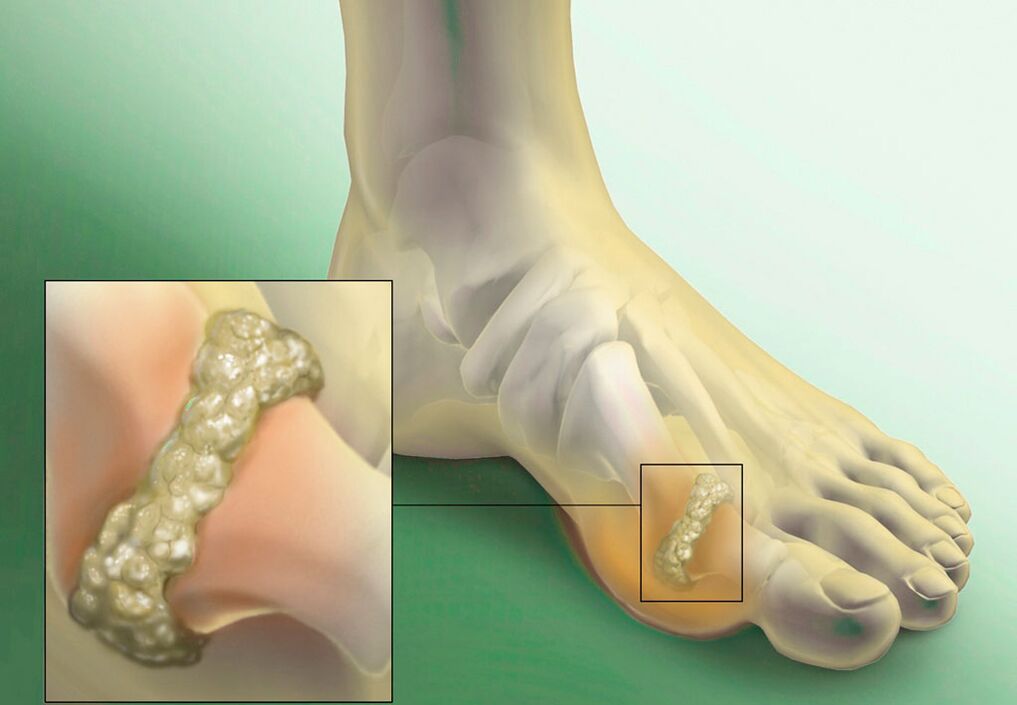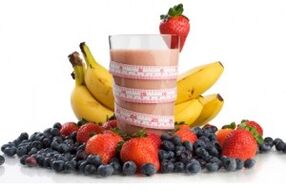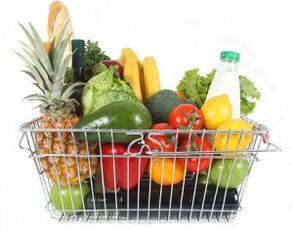The modern world is full of all kinds of food temptations. At every step we are greeted by shops selling bars, chips, buns, pies and other things that, although they look tasty, will sooner or later lead to diseases of the stomach and digestive system in general.
In ancient times, when such diseases occurred, the patient did not know how to treat them and led a normal life, aggravating the condition, resulting in catastrophic and sometimes even fatal consequences.
There are now many treatment options for gastrointestinal and gastrointestinal diseases. But for their successful treatment, you need to limit yourself and completely reconsider your usual diet.
What do we call gout?

Gout is a disease that is directly related to the disorder in the human body. With gout, salts from uric acid are stored in the joint tissues, which leads to very serious consequences. Gout was first mentioned in the time of Hippocrates, and then it had many manifestations.
Today, the disease is fortunately less common, occurring in about three cases per thousand people, although the spread of the disease has become more frequent in recent years.
This increase in the incidence of the disease is due to the amount of food that people eat.
Initially, a sharp increase in the concentration of uric acid in a person's blood causes the disease. Derivatives of this concentration pass through the body with the help of blood and are placed in the joints, muscles and even organs. Such deposits are dangerous because they can destroy infected tissue. The increase in the concentration of this acid is due to the lack of time for the kidneys to process and excrete excessive production. The problem can also be caused by kidney disease and malfunction.
The first symptoms of the disease are joint pain, redness of the thumbs, fever. It is important to note that if you do not consult a doctor at the first symptoms and delay the disease, the affected joint will be completely destroyed, and this will lead to disability, and if the organ is destroyed, it will cause constant pain. and death is possible. Therefore, the disease should be taken as seriously as possible.
Manifestations of gout are directly related to how and what a person eats and lives. It is not without reason that gout was formerly called the "disease of kings" because a sedentary lifestyle, regular consumption of fatty, heavy foods, excessive consumption of alcohol together cause metabolic problems and, consequently, similar diseases. Therefore, in the treatment of gout, it is very important and even the main point to strictly follow a proper diet and diet to reduce acid production. To find out the level of uric acid in the blood, you just need to give blood for analysis.
How to eat properly?

The specificity of the development of the diet for patients with gout is aimed at restoring uric acid metabolism in the body. If you do not take urgent measures to restore this level, excess acids (sodium urate) are repaired throughout the body and cause widespread inflammation.
In addition to prescribing a proper diet, doctors strongly recommend medication, as well as physiotherapy procedures, in addition, a person with gout is advised to lead a more active lifestyle, walk and exercise in the fresh air.
When talking about diet, it should be noted that the necessary step will be the elimination of a number of contraindications from the diet. When the disease worsens, you can not eat fish and meat, it is important to organize fasting days at least twice a week and ideally every day.
Fasting days for a gout patient are:
- Fruit and vegetable. You need to eat one and a half kilograms of fruit per day, which is allowed in the diet.
- Milk and kefir. In this case, the patient should drink up to two liters of this fluid per day.
- Curd and kefir. You need to eat four hundred grams of cottage cheese and drink half a liter of kefir.
Such fasting days are useful in terms of contributing to the dissolution and excretion of uric acid in the body. When the exacerbation of the disease is reduced, the patient can continue to eat fish and meat, but it is seriously steamed, boiled or cooked. It should be remembered that these products should be eaten a maximum of three times a week, not more often.
It is necessary to follow the correct water regime. You need to drink about three liters of clean water a day. In case of exacerbation of the disease, it is necessary to drink an hour before meals. If there is no aggravation, then the water can be replaced with another liquid, the main thing is that it is natural and fresh. You can also drink alkaline mineral water.
Fasting in gout is contraindicated, in which case the acid level will rise sharply, it is better to eat less, but often.
Recommended menu for gout
With gout you need to eat natural and healthy foods. You can prepare a menu of these products for each day, but you should consult your doctor about their dosage, because the diet can be individual for everyone.
List of acceptable products:
- Meat products: turkey, rabbit, chicken; chicken eggs.
- Lean fish; seafood: squid, shrimp.
- Cereals: wheat, oatmeal, millet, rice, buckwheat.
- pasta; black and white bread.
- Vegetables: white cabbage, zucchini, eggplant, cucumbers, beets, potatoes, carrots.
- Onions, garlic, dill.
- Fruits: citrus fruits, apples, pears, apricots, melons and watermelons, peaches.
- Berries: everything is possible except grapes and raspberries; dried fruits other than raisins; nuts.
- Sweet: without chocolate, candy, marmalade, jam, marshmallows, honey.
- Natural drinks: an hour with juices, fruit drinks, fruit drinks, kvass, lemon, hips or bran juice.
- broth, first courses without olive oil; second courses are boiled or steamed products.

You can eat other dishes, but in small quantities, for example, boiled sausage, bacon, sausage. You can eat tomatoes and plums about twice a day and twice a week.
Salt should be completely eliminated or its use significantly restricted. It is better to cook dishes completely without salt and add a little salt to prepared dishes that are already on the table. Of course, most acids, acids and spices should be excluded from the diet.
It is recommended to reduce the consumption of protein foods (especially red meat), because the accelerated metabolism of proteins leads to an increase in urate concentrations. If you are overweight, you should also limit carbohydrate foods (especially baked goods, pastries).
Honey and figs, plums, grapes, some vegetables and root crops (turnips, celery, rhubarb, cauliflower, peppers), as well as mushrooms should be included in your diet only in remission.
Otherwise, it is necessary to consult a doctor who will prescribe a more detailed diet for a certain degree of the disease.





















